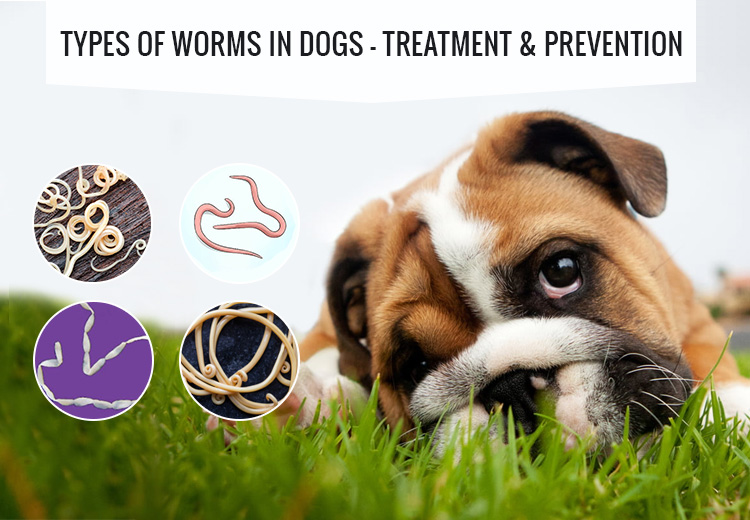Types of Worms in Dogs – Treatment & Prevention

Dogs are the most affectionate creatures in this world, and no pet parent would want these adorable creatures to get infested by the creepy crawlies called worms. It is necessary for pet parents to know that most puppies are actually born with the worms which are contracted from their mother’s milk, while other dogs can acquire worms through fleas or the environment. It’s not just the fleas and ticks that you need to protect your pet from but also the wicked worms.
There are generally five main types of worms found in dogs. Here’s all that you need to know about worms in dogs to protect them from that creepy crawlies.
What are Intestinal Worms in Dogs?
Intestinal worms are parasites that are attached to the dog’s intestinal wall and feed by draining the dog’s nutrients. These worms are present in the gastrointestinal tract of dogs where they flourish and reproduce. The most common varieties of intestinal worms are as follows:
Roundworms
Roundworms are the externally common parasitic worms that are most often found in puppyhood. These parasites are migrating to the puppies through their mother’s tissues, and puppies are also prone to contract roundworms through their mother’s milk. Mainly there are two main species of roundworms that affects dogs: Toxocara Canis and Toxascaris leonine. T canis not only causes fatal diseases in dogs but can also be transmitted to humans. Younger dogs are vulnerable to adult roundworms due to their immature immune system, which cannot fight as effectively as an adult dog can. Roundworms can affect both young and adult dogs, and it can cause intestinal blockage if left untreated.
Hookworms
Hookworms, as the name suggests, hook themselves in the lining of your dog’s intestine. Hookworms in dogs are scientifically known as ‘Ancylostoma caninum.’ These worms have the hook-like mouthpieces which they use to attach themselves to the dog’s intestinal wall where they feed on the tiny blood vessels in the intestinal lining. There are three life stages of hookworms: eggs, larvae, and adult. A horrifying fact of hookworms in dogs is that the hookworms suck blood and therefore cause internal blood loss. It can be a crucial condition for young puppies that may not survive the blood loss without transfusions. The cause of blood loss in dogs due to hookworms may also be the reason for their weight loss and diarrhea.
Tapeworms
Tapeworms are intestinal parasites that attach themselves to the dog’s small intestine. A tapeworm body consists of multiple segments, each with its own reproductive organ. There are different types of tapeworms, but the most common one is caused due to swallowing a tiny infected flea. Tapeworms can grow inside the dog’s intestine when your dog swallow’s a flea that carries tapeworm larvae. Tapeworm looks like a grain of rice and segments of it in dogs may be seen in your dog’s bottom, in your dog’s feces or where your dog sleeps. Sometimes the tapeworm infestation in dogs may appear with no symptoms at all or you may notice vomiting, upset stomach, diarrhea or itching around the anus in your dog.
Whipworms
Whipworms are the intestinal parasites that reside in the cecum of a dog’s body, a part in their body where small and large intestine meet. There the whipworms pass their eggs in the dog’s feces. Generally, dog’s get infected by whipworms by swallowing infective substances that may contain the dog’s feces or soil. Spending time in the contaminated environment can put your dog at the risk of whipworm infection. Dogs infected with few whipworms may not possess signs of infection, whereas severe infection of whipworms can cause bloody stool, dehydration, diarrhea, and weight loss.
Treatment & Prevention
Worm infections are common in dogs, and it can be eliminated easily when used by the best all-wormers in the market, such as:
Popantel All-Wormer Tablets for Dogs– It treats and prevents different worms including hookworms, tapeworms, roundworms, and whipworms in dogs.
Panacur Oral Worming Suspension For Dogs– This is a highly effective and potent treatment against roundworms, hookworms, and tapeworms. It is also efficacious on lungworm in your pets.
What are non-intestinal worms in dogs?
Heartworms are a tremendous issue for pet parents when it comes to non-intestinal worms in dogs.
Heartworms
Among all the worms in dogs, heartworm disease is a potentially fatal disease in dogs which are transmitted only by mosquitoes. The worms reside in the mosquito for a short period of time in order to become infective. When a mosquito bites a dog, it picks up larval heartworms, which eventually circulate in the bloodstream of the infected dog. Heartworm disease in dogs detriments the dog’s health, and affects their quality of life by damaging their lungs, heart, and arteries. The heartworms eggs travel to the dog’s heart and settle in the right heart ventricle. As these worms grow larger and increase in number, they soon begin to cause severe damage to a dog’s heart. Heartworm disease in dogs can cause anemia, right-sided chronic heart failure, rapid heartbeat, and high blood pressure.
Treatment & Prevention
If a dog is diagnosed with heartworms disease, then the best thing to do is immediately take your dog to the vet and consult him for further treatments for heartworms. The vet will advise you with certain treatment protocols for heartworms in dogs.
